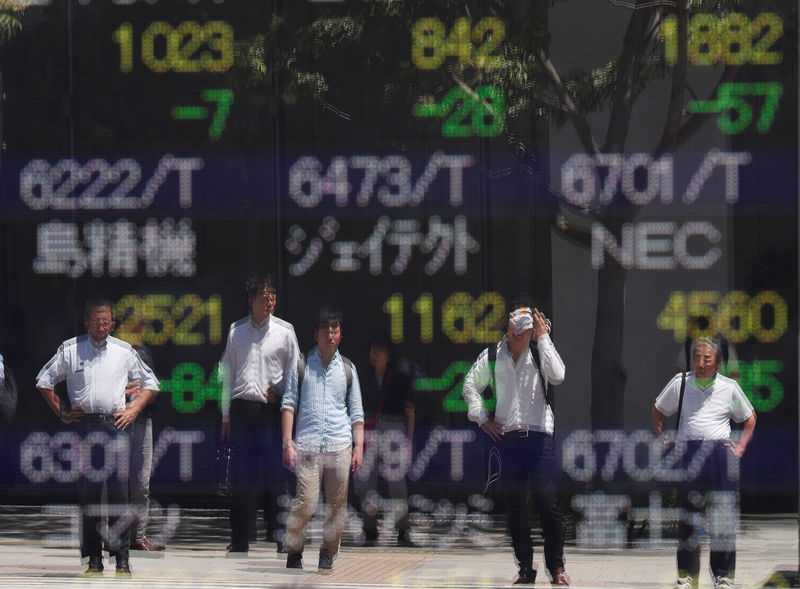This post was originally published on this site
https://i-invdn-com.akamaized.net/trkd-images/LYNXMPEFAE054_L.jpg © Reuters. FILE PHOTO: Passersby are reflected on a stock quotation board outside a brokerage in Tokyo
© Reuters. FILE PHOTO: Passersby are reflected on a stock quotation board outside a brokerage in TokyoBy Marc Jones
LONDON (Reuters) – Hopes of a trade deal between Washington and Beijing turned world stock markets and other risk assets higher on Friday, though an escalating wave of global protests from Hong Kong to Chile left some deep scars.
Europe’s main bourses followed Asia and Wall Street higher () after White House economic advisor Larry Kudlow said on Thursday that the U.S. and China were getting close to an agreement and were talking every day.
“We’re getting close,” he told an event at the Council on Foreign Relations in Washington. “The mood music is pretty good, and that has not always been so in these things.”
It kept alive hopes that MSCI’s 49-country world index and Europe’s could both avoid their first weekly falls since the start of October, but others had little chance.
Emerging market stocks were down 1.7% for the week, while the violent escalation of pro-democracy protests in Hong Kong left the down 4.7%, its worst weekly performance in four months.
Chinese blue-chip shares ended the day down 0.75% and 2.4%, their biggest fall since August, while fierce anti-government protests in Chile gave its currency its worst week since 2011 with a 7% plunge.
Shane Oliver, chief economist at AMP Capital in Sydney, likened regional markets’ bullish reaction to positive trade news to being in a relationship with an alcoholic, driven by entrenched hopes for recovery.
“Markets want to believe that there will be some sort of resolution to this issue, some sort of lasting truce at least, even though the experience of the last 18 months doesn’t give a lot of cause for comfort,” he said.
However, Oliver said weaker Chinese and U.S. economies as well as the U.S. presidential election next year put pressure on both sides to come to an agreement.
In currencies, the safe-haven yen weakened, with the dollar rising 0.17% to buy 108.57 yen. The euro was barely changed at $1.1023 and the , which tracks the greenback against a basket of six major rivals was off just 0.02% at 98.143.
Higher U.S. Treasury yields also illustrated the risk-on tone in the Asian session, with the 10-year yield rising to 1.848% from a US close of 1.815% on Thursday.
The policy-sensitive two-year yield rose to 1.6101% from 1.593% on Thursday after U.S. Federal Reserve Chair Jerome Powell said the risk of the U.S. economy facing a dramatic bust is remote.
A Reuters poll of more than 100 economists showed that while concerns have eased over a U.S. recession, few see an economic rebound, and most believe a trade truce is unlikely in the coming year.
BULLS VS CHINA
Government borrowing costs in Germany and France also inched up on Friday, but were set for sizeable weekly declines, in contrast to southern European countries that have come under heavy selling pressure again this week.
Germany’s 10-year Bund yield was at -0.33% off more than one-week lows hit on Thursday. But it is down 8 bps on the week, set for the biggest weekly fall since mid-August. Dutch 10-year bond yields are down 7 bps this week, and French yields are 5 bps lower,.
Data on Thursday had showed Germany’s economy grew just 0.1% in the third quarter, with consumer spending helping the country to avoid a mild contraction and a technical recession of two quarters of economic shrinkage.
“In general, there has been risk aversion in recent days and a shift to core bond markets from the periphery,” said Daniel Lenz, a rates strategist at DZ Bank.
Global sentiment has been buffeted in recent weeks by conflicting assessments of progress in talks between the United States and China aimed at ending their 16-month-long trade war.
China’s commerce ministry said the two countries are holding “in-depth” discussions on a first phase trade agreement, and that cancelling tariffs is an important condition to reaching a deal.
China has also ended a nearly five-year ban on imports of U.S. poultry meat, which the U.S. Trade Representative said would lead to more than $1 billion in annual shipments to China.
Those developments followed comments from officials from both countries last week that they had a deal to roll back tariffs, only to have U.S. President Donald Trump deny that any such deal had been agreed to.
The new record for the S&P, which gained just 0.08% to 3,096.63, came despite a grim outlook from network gear maker Cisco Systems (NASDAQ:) that underlined the impact of trade uncertainty.
In commodity markets, prices rebounded after sliding Thursday on rising U.S. crude inventories. U.S. West Texas Intermediate crude was 0.44% higher at $57.02 a barrel.
Global benchmark added 0.37% to $62.51 per barrel.
Gold retreated from gains that had been prompted by trade uncertainty. was last trading at $1,463.90 per ounce, down 0.48%. [GOL/]
($1 = 6.9941 )

